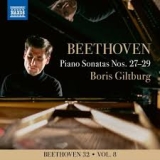 Beethoven 32; Ludwig van Beethoven: Klaviersonaten Nr. 27 op. 90, Nr. 28 op. 101 & Nr. 29 op. 106 (Hammerklavier); Boris Giltburg, Klavier; 1 CD Naxos 9.70314; Aufnahmen 09+11/2020, Veröffentlichung 03/2021 (80'08) – Rezension von Remy Franck
Beethoven 32; Ludwig van Beethoven: Klaviersonaten Nr. 27 op. 90, Nr. 28 op. 101 & Nr. 29 op. 106 (Hammerklavier); Boris Giltburg, Klavier; 1 CD Naxos 9.70314; Aufnahmen 09+11/2020, Veröffentlichung 03/2021 (80'08) – Rezension von Remy Franck
« Mit Lebhaftigkeit und durchaus mit Empfindung und Ausdruck », so bezeichnet Beethoven den ersten der beiden Sätze seiner Klaviersonate Nr. 27. Sie gehört zu den weniger bekannten Sonaten des Zyklus, und Boris Giltburg tut alles, um sie spannend werden und nicht im Schatten anderer Sonaten stehen zu lassen.
Der erste Satz wird ungemein interessant in seinen Kontrasten zwischen heftigen Akkorden und zartester Kantabilität, zwischen Drängen und feiner Nachdenklichkeit.
Wo andere Pianisten nur aufgesetztes, fettes Pathos servieren (Barenboim ist ein gutes Beispiel), kann uns Giltburg mit seiner sehr ursprünglichen und im Ausdruck unmittelbar ansprechenden Interpretation wirklich packen. Nicht weniger spannend ist der zweite Satz, wie von Beethoven gewünscht « singbar vorgetragen ». Diese Natürlichkeit einer perfekten Verbindung von Energie und Sensibilität und einer spontan inspirierten Herausarbeitung von Gegensätzlichkeit finden sich auch in der 28. Sonate.
Und für die 29. Sonate, die sogenannte Hammerklavier-Sonate, hält Giltburg alle sensuellen und dynamischen Mittel bereit, um der Musik zwischen gehauchten Pianissimi und explosiven Fortissimi die Intensität wahrhaftigen Ausdrucks zu geben. Nach dem wilden Scherzo kommt das lange Adagio, in dem Giltburg in einer Mischung von dunklen Gedanken, Melancholie und Lieblichkeit genau das mitteilt, was der Pianist im Booklet so gut beschreibt: « …als Beethoven uns in vollkommener Aufrichtigkeit und Schlichtheit sein Herz eröffnet und uns auf eine unvergessliche Erkundung menschlicher Einsamkeit mitnimmt. » Spannungeladen und gleichzeitig verträumt leitet Giltburg dann über ins Finale, mit anfangs wie unterdrückter Energie, die schließlich uneingeschränkt und regelrecht fieberhaft ausbricht. Und damit ist Giltburg eine weitere herausragende Beethoven-CD gelungen.
« With liveliness and with feeling and expression throughout » is how Beethoven describes the first of the two movements of his Piano Sonata No. 27. It is one of the lesser-known sonatas in the cycle, and Boris Giltburg does everything he can to make it so exciting that it is not overshadowed by other sonatas.
The first movement becomes immensely interesting in its contrasts between fierce chords and the most delicate cantabile, between urging and subtle thoughtfulness.
Where other pianists only serve up fat pathos (Barenboim is a good example), Giltburg can really grab us with his very original interpretation that is immediately appealing. No less exciting is the second movement, « conveyed in a singing manner », as Beethoven wished. This naturalness of a perfect combination of energy and sensitivity and spontaneously inspired contrasts can also be found in the 28th Sonata.
And for the 29th Sonata, the so-called Hammerklavier Sonata, Giltburg keeps all sensual and dynamic means ready to give the music the intensity of true expression between breathed pianissimi and explosive fortissimi. After the wild Scherzo comes the long Adagio, in which Giltburg, in a mixture of dark thoughts, melancholy and sweetness, communicates exactly what the pianist describes so well in the booklet: « …as with complete sincerity and simplicity Beethoven bares his heart, taking us on an unforgettable exploration of human solitude. » The final movement’s introduction is tense and dreamy at the same time, with what at first seems like suppressed energy that finally erupts unrestrained and downright feverish. And with this, Giltburg has succeeded in creating another outstanding Beethoven CD.
























